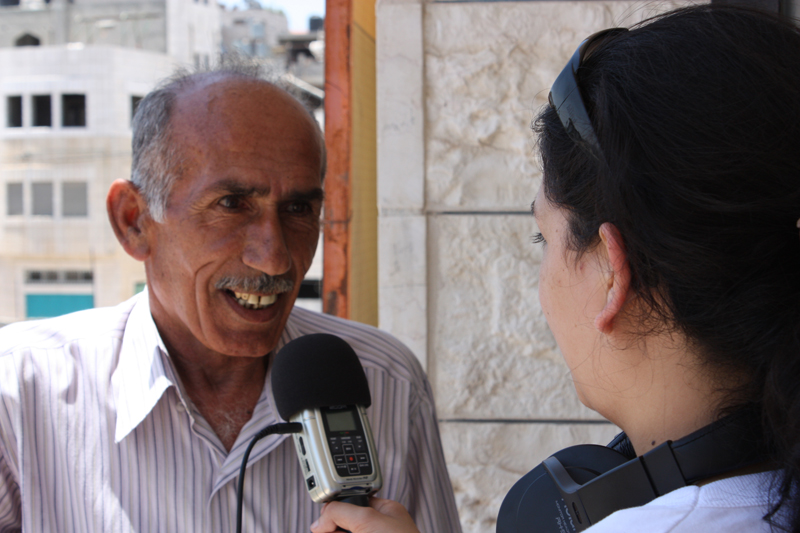Personal stories like this one are extremely difficult to tell, but the telling is very important. It’s taken a long time for Radio Lajee’s Mohammad Qassim to finish this post and it’s been well worth the wait.
Personal Stories
Afif’s Story

In 1948 the year of the Nakba, Afif Gatasha was just six months old. In this recording, he shares the very personal and moving story of his life from then until now.
Sound recording: Layan Al Azza
I want to speak about myself – how my family left our village and became refugees. My family was living in Beit Jebreen village to the west of Hebron about 25 kilometers. At that time, my father and my mother were married two years earlier and I was the first one – and the only one – for them. When the conflict began, some aero-planes came to our villages and dropped many bombs around the village and inside the villages and from that, some massacres happened… And some villagers, they were afraid. So, un-weaponed people went out of the village to save themselves and they thought after one week or more or less, we will return to our villages. They don’t have anything only their clothes.
When the problem took a longer time, my father was at that time about 27 years old and he went with his uncle – who was a friend of his around the same age – to the village to bring something from our house. When they entered at night there was a … a wire. But they didn’t see it, yeah? And there was a mine at the entrance to the house. Yeah the mine exploded and a wall fell on the 2 persons and they died at that time. My mother and my grandfather, (my uncles also) know or heard from some people who went to the village that my father and my uncle had died and my grandfather went to the village and made a grave for the 2 persons and returned.
Yeah we stayed refugees beside our village for about six or seven months. After that, we heard that UNRWA established a camp south of Hebron. So we joined the camp. I lived in the camp at that time – I was small, but I remember everything from my childhood at that time. We walked in the streets without shoes, with old clothes. But, the main thing that I thank UNRWA for is the education, really. They established schools. But at that time, the schools were in tents also. Yeah, when I was in the first and the second class I remember that when we sat on the desk – especially in winter we had to raise our legs so that the icy water went under our feet.
After that, in ’56 when the issue was [still] not resolved, UNRWA helped the people to build shelters. The family with six persons was given one room for everything. The families with 6 – 12 persons were given 2 rooms.
But in ’67, when the Arab Israeli conflict happened – the war and Israel occupied West Bank and the Gaza Strip after that I decided to go to Beit Jebreen so I can see the village and visit my father’s grave. At that time really I got a big shock because I can’t enter the village because it’s demolished – all of it! And, there’s a fence around the village. This is the bad thing that I remember every time, that I can’t visit my father’s grave.
I continued with my studies at the Fawwar Camp from first grade until year 9 and then after that I went to Hebron to study from years 9 – 12. I then went also to the Teachers’ Institute in Ramallah which UNRWA is responsible for. I worked as a teacher for about 25 years, for seven of them I was a school supervisor for physical education. And then I worked here as a Camp Services Officer or the Director of Aida Camp and Al Azzeh Camps. Then I retired.
When I was working with UNRWA I continued my studies at Arab Beirut University in Law. In ’72 I married the head teacher of Fawwar Camp Girls’ School; I have three boys and one girl. Two of them are doctors, one is an engineer and my daughter is a pharmacist.

